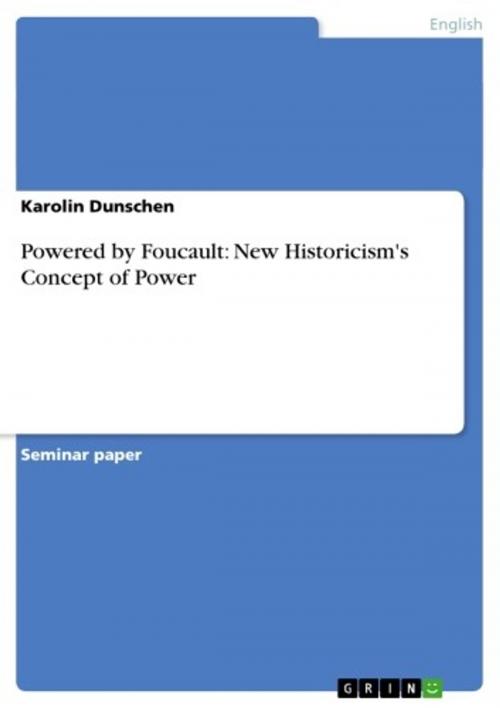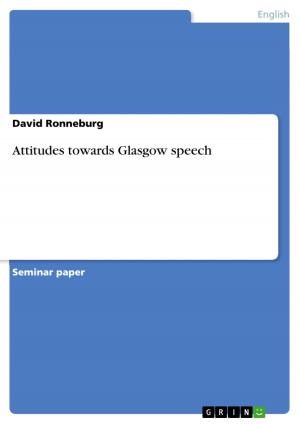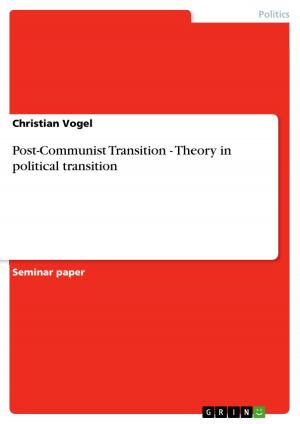Powered by Foucault: New Historicism's Concept of Power
Fiction & Literature, Literary Theory & Criticism, British| Author: | Karolin Dunschen | ISBN: | 9783638393300 |
| Publisher: | GRIN Publishing | Publication: | July 5, 2005 |
| Imprint: | GRIN Publishing | Language: | English |
| Author: | Karolin Dunschen |
| ISBN: | 9783638393300 |
| Publisher: | GRIN Publishing |
| Publication: | July 5, 2005 |
| Imprint: | GRIN Publishing |
| Language: | English |
Seminar paper from the year 2005 in the subject English Language and Literature Studies - Literature, grade: 1,0, University of Cologne (English Department), course: ES II The Wonderful World of Literary Theory, 49 entries in the bibliography, language: English, abstract: I don't want to 'improvise on the metaphor Deleuze used to describe the way he made use of fellow philosophers (though he usually made use of them in quite a gentle manner) to come across with his own ideas. I rather like to think of such theorists as Nietzsche, Foucault, or Greenblatt in a more detached manner as atomic particles that hardly ever meet, but sometimes do, and when they crash make something emerge that may be new and may be not. I'd like to take some of that enthusiastic energy Greenblatt felt when first he met Foucault and heard him lecture and let this paper run on it. I will follow that 'thread' of power that in a way puts Nietzsche, Foucault, and Greenblatt in touch in order to figure out whether there is anything new about new historicism's concept of power as compared to that of Nietzsche and Foucault. In the following a brief outline will be given of how Nietzsche employs power to understand how the cosmos works. Then I shall describe Foucault's understanding of how power relations condition society, government, discourse, and the way we look at things. Afterwards I shall discuss new historicism's concept of power, focussing on the consequences this concept of power has for the understanding of the relation between society and works of art and for the interpretation of literary and historical texts. In the end there will be a short outlook on what could be an answer to the question of whether there is anything new about new historicism's concept of power.
Seminar paper from the year 2005 in the subject English Language and Literature Studies - Literature, grade: 1,0, University of Cologne (English Department), course: ES II The Wonderful World of Literary Theory, 49 entries in the bibliography, language: English, abstract: I don't want to 'improvise on the metaphor Deleuze used to describe the way he made use of fellow philosophers (though he usually made use of them in quite a gentle manner) to come across with his own ideas. I rather like to think of such theorists as Nietzsche, Foucault, or Greenblatt in a more detached manner as atomic particles that hardly ever meet, but sometimes do, and when they crash make something emerge that may be new and may be not. I'd like to take some of that enthusiastic energy Greenblatt felt when first he met Foucault and heard him lecture and let this paper run on it. I will follow that 'thread' of power that in a way puts Nietzsche, Foucault, and Greenblatt in touch in order to figure out whether there is anything new about new historicism's concept of power as compared to that of Nietzsche and Foucault. In the following a brief outline will be given of how Nietzsche employs power to understand how the cosmos works. Then I shall describe Foucault's understanding of how power relations condition society, government, discourse, and the way we look at things. Afterwards I shall discuss new historicism's concept of power, focussing on the consequences this concept of power has for the understanding of the relation between society and works of art and for the interpretation of literary and historical texts. In the end there will be a short outlook on what could be an answer to the question of whether there is anything new about new historicism's concept of power.















